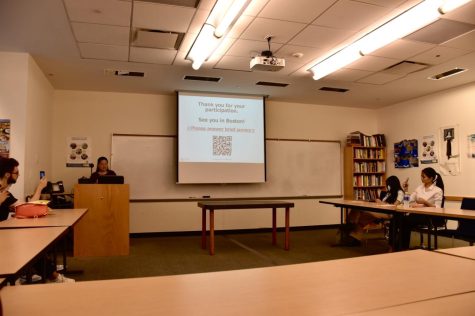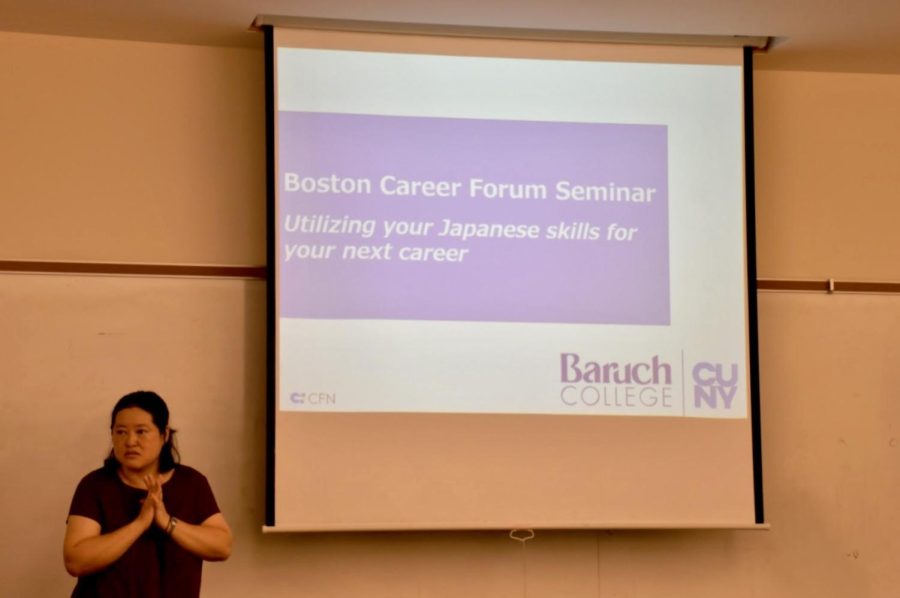Baruch seminar explains corporate job search in Japanese market
September 17, 2022
The Baruch College Japanese Program and Baruch Japan Club held a joint seminar event on Sept. 13 for students to learn how to utilize their knowledge of the language and culture when applying for work in the Japanese corporate job market.
DISCO International Inc.’s Kozue Yokota and Nana Jitsukawa were invited as guest speakers, with the latter graduating from Baruch in 2019.
Although the name sounds melodic, “DISCO” is an acronym short for “Development of Information Services or Career Opportunities.” The global firm specializes in Japanese-English bilingual job recruitment services, helping people secure work in Japanese companies or international subsidiaries.
The seminar introduced students to the difference in hiring practices in Japan versus the United States. Noted in the seminar was how positions do not have to correspond with students’ majors in Japan.
“In Japan, a lot of companies hire new graduates all at once,” Yokota said. “That’s because they have an extensive training program that they start, so one thing is that your major doesn’t necessarily have to lead with the industry or the position you’re going into.”
When applying for a position in Japan, prospective employees should submit a cover letter that expresses their interest in a company and a Japanese-style resume or “rirekisho.” When applying from abroad, Yokota suggested following the specific formatting of a rirekisho because it will be easier for hiring managers to read.
A major focus at the seminar was the firm’s annual career forums. It differs from a typical job fair, in which attendees usually go to a company’s booth just to submit a resume and make light conversation, only to be told “we’ll get back to you later.”
“For our career forums, […] you actually get to talk to the companies,” Yokota said. “You actually start the interview on the spot, so we tell anybody who comes to a career forum, when you enter the booth, pretend as though the interview has already started. It might be a casual conversation, but it may already be your first.”
In her explanation of the job recruiting cycle in Japan, Yokota suggested that students attend a career forum during their junior year to connect with employers and make way for a summer internship. While she said these internships may last as short as a day, it will expose students to the corporate setting and the company culture.
The seminar also aimed to prepare students for DISCO International’s next career forum in Boston from Nov. 4 to Nov. 6. The largest of the firm’s forums, the Boston Career Forum welcomed 241 companies and 5,609 attendees over three days in 2019.
Students may schedule an appointment to meet with and be interviewed by companies at the forum through its website, where they can get information on the selection process. If they miss the deadline to apply, they may walk in early to a company’s booth.
To prepare for onsite interviews, students should research the companies they are interested in and analyze themselves for what their strong points are.
Due to the COVID-19 pandemic and travel concerns, some companies have shifted more of their interviews online. This coming in-person forum is projected to have 150 companies and 3,500 attendees, and some of the companies this year include Abbott Japan, Bloomberg L.P., Deloitte, Ernst & Young and Morgan Stanley.
For non-native Japanese speakers who are not confident about skills but want to pursue work in the Japanese job market, Yokota said some companies and positions do not require a high level of language knowledge, though having a high score on the Japanese Language Proficiency Test is a bonus.
Showing interest in the company and Japanese culture may benefit non-native seekers, especially if they have experience visiting or studying abroad in Japan.
Strong language skills would be required for jobs that involve a lot of communication such as those in advertisement, but jobs with minimal communication such as programming may not require it. However, Yokota encourages students to go for jobs they have been working hard to pursue.
“Just because this [job] is native level, not native level, you can see the job description and see if you can do the job,” Yokota said. “That both goes for both English and Japanese.”









